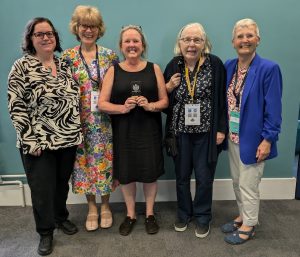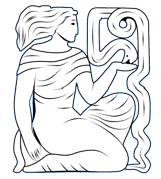Teresa Doherty, RCN Joint Head of Library and Archives and Professional Lead for the History of Nursing, and Dr Sarah Rogers, Independent Researcher.
Nurses are not only hidden from history: even today, we have to assert the right for impactful nurses to be included on Wikipedia. In April 2024, the Wikipedia project Women in Red found that just 19.8% of the 1,998,699 Wikipedia biographical articles in English were about women, and that women’s biographies are more likely to be nominated for deletion than existing articles about men.[1] Not only are women underrepresented on Wikipedia, so too are nurses, who are often hidden from history.[2] This is not just an issue for Wikipedia, the world’s free online encyclopaedia; the Oxford Dictionary of National Biography(ODNB) has over 65,000 biographies of which around 13% are of women and just 116 biographies are of nurses. The Royal College of Nursing (RCN) History of Nursing Forum (HONF) is taking steps to change this, first with our ODNB projects which in collaboration with UKAHN pushed the number of nursing biographies up to and over one hundred, and now with our Nurses in Red Wikipedia editing group.
Since the RCN Nurses in Red Wikipedia project commenced two years ago, our team members regularly encounter the attitude that several of the senior nursing leaders whom we are writing Wiki articles about, or for whom we are adding to Wiki pages, are ‘Just a Nurse’, the implication being that they are not worthy of inclusion on Wikipedia. Nursing is the largest single global profession with individuals who have led the way in leadership, clinical innovation, academia, and specialist care settings, but this is not reflected in public history fora such as Wikipedia. Yet if you search for information about many famous, or indeed infamous people on Wikipedia, there is a plethora of articles about individuals who, it could be argued, have not made as much impact to humankind as many nurses have. You are more likely to find a Wikipedia page for a D list celebrity than a hospital page which includes their matrons – even when listing notable staff and patients.
The RCN History of Nursing Forum is open to members (nurse or health support workers) who enjoy history. In 2014 the RCN held a one-day Wikithon session as part of the First World War commemorations, but despite great interest, activity was not maintained. In 2022 we set up an online community for members to train as Wikipedia editors, naming the project Nurses in Red after the Women in Red Project. Wikipedia encourages editors to create links between its articles, these links being given in blue text: any links in red indicate that no article exists, so Women in Red and Nurses in Red aim to turn those red links blue. This time we tried a new format and held an online Monday lunchtime course for six weeks. Initial training was followed by question-and-answer workshops. This covered the basics in how to edit and write Wiki pages and Wiki data. We really enjoyed this format and at the end of this we decided to meet monthly.
The RCN provides us with a dedicated Teams channel, where we ask for advice and encouragement between meetings. This is also where we can access recordings of training and ‘how to’ guides, and share plans for work in progress. This has enabled us to create a group that is truly UK-wide, which is reflected in the diversity of articles written.
Alice White, an expert Wikimedian, provides Wiki support and Teresa Doherty from the RCN gives archive advice. Our Wiki skills are steadily improving, and we have learnt how to add biography boxes and images. We are growing in confidence and getting better at writing, and braver at launching new pages. Initially we mainly edited and improved existing articles, such as hospital pages, but we have now written thirty one new Wiki pages with many more in the pipeline.
Each of us can pursue our own interests but we can also buddy up with each other. We are focusing on projects such as adding and amending Wiki pages about deceased RCN Fellows, Matrons missing off hospital Wiki pages in London and elsewhere, and influential matrons, nurses and nursing leaders in Ireland, and Scotland. Sarah Rogers is currently adding 474 Matrons whom she identified during her PhD thesis, either onto hospital pages, or by writing their own Wiki page. We are also adding reports and information about the structure and organisation of nursing in the UK: Alice has written articles about nursing related reports, such as The Briggs Report, and Teresa has compiled a list of nursing organisations in the United Kingdom.
Over the past two years we have made a significant impact and not only are members enjoying getting to know each other but we are sharing our love of the history of nursing. We have acquired new skills, either in technical editing, or in research – which is largely online. Currently we have six active editors, who have made nearly 2500 edits, over 342 articles, added 120,000 words and nearly 2000 references. Our pages have been viewed by eight million people from around the world. Seeing our user data each month spurs us on to continue editing and shows how we are slowly making an impact.
Wikipedia has robust guidelines about which people can have a Wiki biography. Individuals have to fit the notability criteria such as an impactful career and hold a post-nominal award such as the RRC, MBE, or are an RCN Fellow. Wikipedia also favours published references, so sources available via the RCN online historical journals (available as part of Gale’s Women’s Archive: Female Forerunners) have been particularly useful. Sue Campbell wrote an article about Eliza Mackenzie, the Scottish Superintendent of Naval Nurses during the Crimean War, who had a biography in the ODNB, but was not on Wiki, and was not even mentioned on Eliza’s father’s Wiki page.[3] Sue Yasee has written a biography for John Greene OBE, FRCN, and Teresa has amended and added Wiki pages for several RCN Fellows including Dame Elizabeth Harriet Fradd, DBE, FRCN.[4]
We have all found that matrons are overlooked in hospital histories, and even if they do not meet the criteria for an individual page, we have been trying to redress the balance by adding their names onto hospital articles. Vari Drennan found that the Westminster Hospital page failed to mention any nurses connected to the hospital, thereby excluding leading nurse reformers such as Edith Smith, Rosalind Paget and Eva Luckes.[5] Vari has now written a Wiki page for Edith Smith, OBE, ARRC.[6] Margaret Graham observed that no matrons were mentioned on the page for the Royal Victoria Hospital, Belfast, and having rectified that omission, she worked collaboratively with Student Nurse Chelsea Bell on a Wiki article about Mary Kathleen Robb, OBE, OStJ, FRCN one of those unacknowledged yet highly impactful matrons.[7]
The links between Wiki articles are hugely important when improving the visibility of nursing. When writing articles on nursing reports we have found the male Chairs are always mentioned by name and linked to their own biographical article, but the female nurses (who were usually the experts in the field) have not even been mentioned by name, let alone have their own article. We have found working on links is a good investment as this often draws Wiki users into other pages about nursing. We were amused to find that links to hops (an agricultural product used in brewing) from an article written by Sarah about the Maidstone Typhoid Epidemic has attracted over 460,000 views to nursing. Similarly, since Teresa edited an article about Michael Rosen, an Honorary Fellow of the RCN, links to nursing from his page have received over 310,000 views.[8]
With any project there are always challenges, and not just the personal ones of learning how to edit on Wikipedia. We have also found that there are many enthusiastic Wiki editors online around the world, very eager to correct our typos, or edit our material, even whilst we are still writing. We are learning how to manage them and engage with those who think that because someone is ‘Just a Nurse’ they do not deserve a place on Wiki. We also correct misinformation related to nursing; Vari noticed that an illustration of an RCN badge was incorrect and was eventually able to add the correct image.
As far as we are aware we are the only professional group editing on Wikipedia, and the only group who meet regularly online for support and encouragement. Information about future training will be shared with HONF members, so please make sure your contact details are up to date. In November, the HONF was delighted to win the 2023 Wikimedia UK, Partnership of the Year Award, which was awarded at an online meeting. We were therefore delighted when some of us could meet up in person at UKAHN’s 2024 Colloquium in Greenwich and see the actual award (pictured below).

[Figure 1] HONF members L to R: Teresa Doherty, Sarah Rogers, Sue Campbell, Sue Yasee, Vari Drennan
It was important to have feedback from the colloquium attendees; Professor Odette Best has led a similar campaign to increase the number of nurses’ biographies in the Australian Dictionary of National Biographywith similar challenges. The global work needed to ‘unhide’ the history of nursing and nurses, particularly in the public’s perception of history, will require us all to be persistent in our endeavours.
Endnotes
[1] Gender Metrics [online], Humaniki. Available at: https://humaniki.wmcloud.org/search [accessed 2 July 2024]. Khandaker Tasnim Huq and Giovanni Luca Ciampaglia, Gender Gap in Wikipedia: Are Women Vanishing Soon? [online], Wiki Workshop, 11th edition, 20 June 2024. Available at: https://wikiworkshop.org/papers/gender-gap-in-wikipedia-are-notable-women-vanishing-soon.pdf [accessed 15 July 2024].
[2] Sheila Rowbotham, Hidden from History, (London: Penguin, 1975).
[3] Elizabeth McKenzie [online], Wikipedia. Available at: https://en.wikipedia.org/wiki/Eliza_Mackenzie [accessed 15 July 2024].
[4] John Greene (nurse) [online], Wikipedia. Available at: https://en.wikipedia.org/wiki/John_Greene_(nurse) [accessed 15 July 2024]. Elizabeth Fradd [online], Wikipedia. Available at: https://en.wikipedia.org/wiki/Elizabeth_Fradd [accessed 15 July 2024].
[5] Westminster Hospital [online], Wikipedia. Available at: https://en.wikipedia.org/wiki/Westminster_Hospital [accessed 15 July 2024].
[6] Edith Smith (nurse) [online], Wikipedia. Available at: https://en.wikipedia.org/wiki/Edith_Smith_(nurse) [accessed 15 July 2024].
[7] Kathleen Robb [online], Wikipedia. Available at: https://en.wikipedia.org/wiki/Kathleen_Robb [accessed 15 July 2024].
[8] Maidstone typhoid epidemic [online], Wikipedia. Available at: https://en.wikipedia.org/wiki/Maidstone_typhoid_epidemic[accessed 15 July 2024]. Michael Rosen [online], Wikipedia. Available at: https://en.wikipedia.org/wiki/Michael_Rosen [accessed 15 July 2024].
